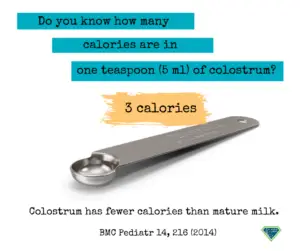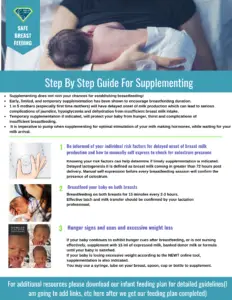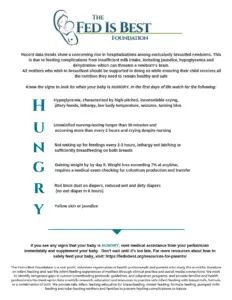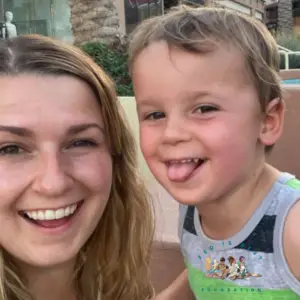Knowing now how many babies have been lost or suffered an injury due to insufficient nutrition and dehydration in those early days, I feel so much anger towards those staff who dismissed my concerns, as we could so easily have gone the same way. By this point, my son’s urine was like brick dust and barely meeting the minimum frequency—but home we went, away from any medical supervision.
t has taken me nearly three years to put this story into writing; despite watching my son grow into a happy and healthy little man, I could not revisit the trauma of his early months in my mind for a very long time, without feeling such strong emotions that it might as well have happened yesterday. Despite my difficulty telling this story, I wanted other mothers to hear it because I suspect I’m not alone in my experiences; and the more people who come forward with similar trauma, the more likely things are to change.
After a difficult pregnancy during which I suffered from hyperemesis gravidarum, I was excited for my son to be born—mostly because I so thoroughly disliked the feeling of being pregnant, with constant nausea and vomiting. I knew very little about caring for newborns, but I knew I wanted to try breastfeeding. I do however recall stating if it works it works, but if not I will bottle feed. I do wish I’d remembered that mindset once he was born.
His birth was fairly uneventful, for which I am grateful, as I know so many mothers who were traumatized by the birth aspect of entering motherhood. He came out crying of course as babies do, but when they laid him on my chest, he continued to cry for minutes afterward. I remember thinking, wait… aren’t I supposed to be a comfort to him? On TV babies stop crying when handed to mum….I’m already failing.
A few minutes after his birth I asked the nurse when I should try breastfeeding him. She suggested we try then and there in the delivery room. It was instantly apparent that the poor little guy was not a natural at this. The nurse aggressively (in my opinion) kept forcing his face into my breast; he cried harder and harder every time, gagging and slipping off the breast immediately. She then commented that in her experience if they didn’t get that first latch right after birth then they weren’t ever going to figure it out, so she said she would arrange for the hospital lactation consultant to stop by. In the meantime, I was given no guidance on what to do if he seemed hungry. Around three or four hours after his birth, the lactation consultant stopped by. She mostly just criticized the way I positioned this child who I had met mere hours ago; then she concluded he could not latch since he was likely tongue tied. She said a doctor could confirm that later during their rounds. She left me with a hand pump, hospital grade pump, and nipple shields, with instructions to baby latch onto my breast with the shield, and to hand express and pump whenever he was not latched (who needs sleep, right?). In my sleep deprived state, I took this very literally. I made it my life mission to try and provide some colostrum for this tiny human, whom I already felt like I was failing.
By the end of that day, I had produced mere drops of colostrum, literally 0.1 ml per hour, and bruised my breasts in the process. I finally succumbed to sleep around 11 p.m., after having been awake for approximately 29 hours—only to be woken at midnight so he could have his first bath. Since he was hungry and discontent, and not having been really fed yet, he was fussy all night. Each hour, my husband and I took turns holding him while the other slept until my husband declared he needed more sleep. I was left awake holding my baby until morning, since he wouldn’t settle in the bassinet.

Feeding your baby just drops of colostrum are never enough!
I don’t remember much of the second day, but I do recall lots of interruptions—nurses collecting mine and baby’s vitals at separate times, lactation consultant visit, souvenir birth certificate visit, real birth certificate visit, the kitchen staff coming to ask what they could possibly feed a vegan, OB visit, pediatrician visit, and hospital baby photographer—so no sleep was had then either. It’s remarkable that despite so many visits, no one is really helping you or seeing if you—the mother—are ok, they’re just checking things off their to-do list.
I vividly recall telling both the pediatrician, nurses, and lactation consultant that I was producing barely any colostrum and kept getting the response of “babies aren’t born needing to eat” so not to worry that he was getting next to nothing.
Temporary Formula supplementation was never mentioned at any point as an option, and I truly did not know that you could do both. I thought breastfeeding was all or nothing, so I trusted the professionals.

Step-by-step guidelines for supplementation.
That second night was even more horrible than the OB had warned me it would be. My baby cried nearly the entire night. He was hungry, and I could not satisfy him. After recognizing his prolonged crying, a nurse came in, saw me with a hand pump in one hand and an electric pump in the other while my husband held our baby, and said “oh no wonder he’s crying, he’s hungry! I’m sorry but no s# lady! I broke down crying for the first time since birth then and there. Even now, thinking about that moment brings me to tears. Why was no one suggesting supplementing to us? Surely a tongue tie and inability to produce more than drops of colostrum in a day meet the criteria for supplementation use even in a baby-friendly hospital? I guess not though, as the word supplementation never came out of a single staff member’s mouth during my time in the hospital.

The morning after that horrible night, I was offered another night in the hospital by my OB because of my breakdown. I politely declined, as I could not handle the interruptions anymore, nor the lack of support. At birth, little man was 6 lb 6 oz, and upon leaving the hospital that third day, he was 6 lb even, so they happily sent me home; that arbitrary excessive weight loss number hadn’t been reached, so we were good to go.
My milk, fortunately, came in on day four, when my mum arrived from the UK to come to help me. He no longer seemed dehydrated thankfully, since I was able to finally pump sufficient amounts and syringe feed. We had outpatient lactation consultant appointments every few days those first couple weeks to monitor his weight gain, and we were able to get his tongue tie lasered at 10 days old. I had hoped that we would be good after that and that our struggles were over for feeding. I was having a really hard time with what (I thought) was his cluster feeding. He would be latched for hours at a time, and as soon as I unlatched him, he would be asking for milk again. I now recognize that his latch was simply so poor that he wasn’t getting enough milk quickly enough, so he compensated by staying latched constantly.
My mum had bottle-fed all of her children, so she tried gently assuring me that since breastfeeding was not working for us, he would be fine if we bottle-fed. But, I wouldn’t hear it. I had been so bombarded by the posters in the hospital and LC office about the health risks of formula, and so shielded from anything but direct exclusive breastfeeding by the so-called professionals around me, that I had tunnel vision for it and saw no other feeding method as an option.
Unfortunately—poor latch aside—once he was adequately receiving my milk, it became quickly apparent that he was not tolerating the milk itself; his stool was slimy green and mucousy. He was having around 20 scant bowel movements a day and constant gas and discomfort. Our pediatrician believed it was a milk protein allergy; however, as a vegan, I had already been dairy and egg-free for years. Given that dairy is the most common allergen, it wasn’t obvious what I would need to cut out, so the doctor wanted me to try cutting out soy. After that didn’t work, then I needed to cut out wheat also. I ate very little during this time, partly because I became terrified of food and partly because I was so stressed from our feeding struggles that I had no appetite at all. I had to force myself to eat.
Despite the doctor having somewhat confirmed a milk protein allergy by detecting the presence of blood in his stool, The lactation consultant provided through the hospital where I delivered, disagreed with the pediatrician on what was causing his digestive issues. Because he still had a poor latch and nursed constantly, she suspected he was “snacking,” and it was a foremilk–hindmilk imbalance. His stools did not improve with the spacing of feeds, so the LC wanted me to try block feeding. We carried this routine on for weeks, playing around with how he fed off my breasts, and all the while he and I were suffering horribly. Some mornings I’d be crying, begging my husband to stay home from work. My mental health was deteriorating rapidly.
My mum left back to England when he was three weeks old, and my husband had already been back to work a week at that point. I was so alone. I hate to admit this, but there were times I was so exhausted from the sleep deprivation and having to be in constant motion with my son during the day, I would have horrible intrusive thoughts that I wished he wouldn’t wake up from his sleep so I wouldn’t have to continue this life I was living.
Now, I look at this beautiful sweet boy and am horrified that I could ever have thought that, but breastfeeding pushed me to my absolute limits. I have never felt so unhappy or so stressed in my entire life, and the “professionals” didn’t see it.
At six weeks old, my son suddenly seemed like he couldn’t get enough milk from me. I suspect prior to the block feeding, he relied on my initial letdown for sustenance and couldn’t stimulate further letdowns—which explains why he ate so frequently; but once I had reduced my supply with block feeding, the first letdown wasn’t enough to satisfy him. He would chomp on my breast for a few seconds repeatedly and just cry pitifully. At that point, I decided to switch to exclusive pumping so I could see what he was getting. But try pumping every two hours, with a baby that is never content out of your arms and needs constant motion. The stress of feeding had completely isolated me. I could not handle the thought of visitors when I knew I would be hooked up to my pump most of the time; so I only left the house for doctor appointments and the lactation support group.
One morning, my friend texted me to say she was listening to a story on NPR about a woman whose story was remarkably similar to mine. I believe she was a pediatrician or at least a medical doctor. She also experienced constant screaming and bouncing, although her baby needed to be hospitalized after being so ill from her milk. She described the new baby she received when she finally switched to formula.
It was the first time I had ever heard formula being discussed positively! I decided at that moment that, despite the bombardment of “breast is best” propaganda, that it just was not best for my child. We switched to formula that evening. Instantly his stools improved, and within days I could simply sit and hold him and enjoy him.
You cannot bond with a child that screams every waking moment, but suddenly I had this little boy who I could snuggle, who smiled at me and actually seemed comforted by my presence. He thrived on formula, meeting all his milestones early or on time, and became the most content sweetest little baby. I have so much regret not quitting breastfeeding earlier because of this and feel so let down by the professionals around me for being so anti-formula. I really hope this story makes at least one mother recognize that breastfeeding is not for all babies, and infant formula is like medicine for some babies, and my baby was one of them.
#fedisbest

If you need infant feeding support, we have a private support group– Join us here.
Knowing if Your Newborn is HUNGRY and Needs Urgent Evaluation / Supplementation
I Supplemented My Baby Until My Milk Came In And We Are Still Breastfeeding At 3 Months


One thought on “I HAVE SO MUCH REGRET NOT QUITTING BREASTFEEDING EARLIER; WE SUFFERED AND FEEL VERY LET DOWN BY PROFESSIONALS AROUND ME FOR BEING SO ANTI-FORMULA”